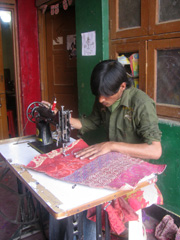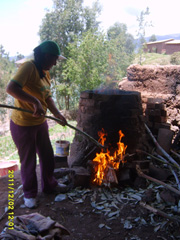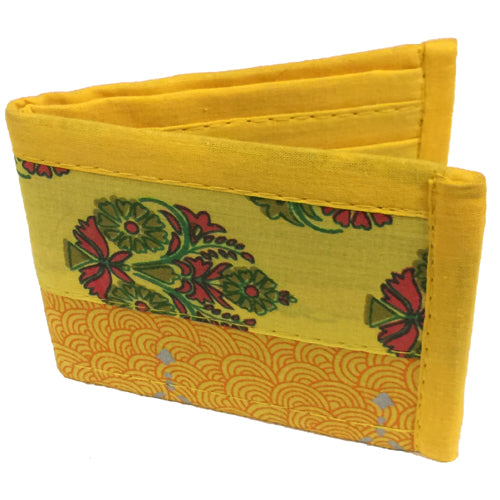OWP
Patchwork Wallet
Patchwork Wallet
Couldn't load pickup availability
Share
This wallet is made from recycled, re-purposed fabric. Available in three colorways, this trendy and smart wallet is perfect to keep your bills and coins in place.
These wallets are handmade by the youth at Lakshya shelter home in Faridabad, India. Lakshya primarily supports children and youth who have run away from their homes. Lakshya, sends the younger children to local schooling facilities, and the youth are given vocational trainings to help earn a living and support themselves. Buy these unique products and support Lakshya's objective of providing better living and educational facilities to these children.
- Measures 3-1/2” x 4-1/2” closed, 3-1/2” x 9-1/2” opened
- 4 card slots, 1 billfold with a divider
Handmade in India and Fair Trade imported.
Lakshya, is a child and youth rehabilitation center located in a small village Bhatola, Faridabad, a few miles from Delhi. Lakshya was founded in 2004 by two brothers, Rajeev and Umesh; they started by training a few village women in making newspaper bags. The village women grew from 8 to 150 over the years, and today make newspaper and other paper packaging bags which are supplied to several stores in India.
 Rajeev and Umesh were part of a larger youth rehabilitaion programe, Karm Marg in New-Delhi. They began their own initiative by the name of “Lakshya”, meaning goal. With the support of the Salam Balak Trust, a well known children and youth rehabilitation center, Lakshya currently runs a center in the village. Many youth and children, who have either runaway from homes or orphaned are found at public places such as railway stations and bus stands. Lakshya's network of people, who closely monitor these locations and keep a regular contact with the local police, bring these youth and children to the shelter. In some cases, parents or relatives are contacted and the children are sent back, in other cases they stay at the shelter for sometime and escape again, while some stay on. Currently, Lakshya supports a mixed group of 25 youth and children in the age group of 7-25 years.
Rajeev and Umesh were part of a larger youth rehabilitaion programe, Karm Marg in New-Delhi. They began their own initiative by the name of “Lakshya”, meaning goal. With the support of the Salam Balak Trust, a well known children and youth rehabilitation center, Lakshya currently runs a center in the village. Many youth and children, who have either runaway from homes or orphaned are found at public places such as railway stations and bus stands. Lakshya's network of people, who closely monitor these locations and keep a regular contact with the local police, bring these youth and children to the shelter. In some cases, parents or relatives are contacted and the children are sent back, in other cases they stay at the shelter for sometime and escape again, while some stay on. Currently, Lakshya supports a mixed group of 25 youth and children in the age group of 7-25 years.
At Lakshya, younger children in the age group of 7-16 years are sent to local schooling facilities. Due to limited funds, the organization has not been able to sponser children for further education. So, the youth learm several vocational skills which will help them to earn a living in the future. 5-6 youth are trained in making patchwork bags and other accessories such as, diary covers, wallets, purses and belts. Other vocational trainings include administrative jobs, cooking & catering, auto mechanics etc. Lakshya sells the handmade bags and other products made by these youth at the shelter through exhibitions and a few stores across India. The organization hopes to rescue and rehabilitate more children and youth who have runaway from their homes, and is constatntly trying to provide them with a more meaningful way to live.
About the Artisans
About the Artisans
Ceramica Quinua, an artisan cooperative known for its social and environmental responsibility, offers steady work to six workshops and 36 families in Ayachucho, Peru. Ceramica Quinua is dedicated to decreasing the use of firewood to reduce deforestation, and as such, works primarily with clay, which is extracted from the land in a controlled manner to avoid erosion.
The artisans shape and fire their pieces in home-based workshops during their nine-hour workday. Children often sit in on the workshops during their free time in so they may learn the trade that's been passed from ancestor to ancestor. The organization also takes pride in offering health care for its craftsmen, and for sharing its environmental knowledge and conservation techniques with students at public schools.
The Quinua district is characterized by the eucalyptus and alder-scented atmosphere of its mountain and forest landscapes. The name Quinua is derived from the Qenwal plant, said to be comparable in beauty only to the Quinuin women. The unique flora and fauna that inhabit the territory are fast becoming a major tourist attraction. Unfortunately, deforestation and pollution from paint chemicals are threatening their existence.

Materials
Materials
Dimensions
Dimensions
Care information
Care information








Subscribe to our emails
Subscribe to our mailing list for insider news, product launches, and more.








